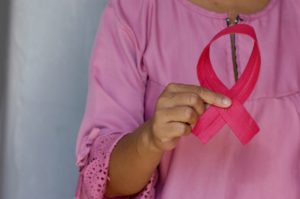 Under age 50? What you need to know about your risk
Under age 50? What you need to know about your risk
Any diagnosis of breast cancer is difficult, but when you’re under age 50, you can add surprise and shock to the list of reactions. While breast cancer is rare in younger women, the disease can and sometimes does strike early.
The Centers for Disease Control and Prevention (CDC) estimates that 11 percent of new cases of breast cancer occur in women 45 and under. Even women in their twenties can develop breast cancer, though the odds are relatively low (about one in 1,500, according to the American Cancer Society).
Are you at risk?
Certain factors increase the likelihood of a breast cancer diagnosis before you’re 45.
- Family history of breast or ovarian cancer before 45 in first-degree relatives (mother, sister).
- Genetics. Mutations in the breast-cancer genes BRCA1 and/or BRCA2.
- Heritage, including women of Ashkenazi Jewish descent.
- Radiation exposure in childhood or adolescence.
Reducing breast cancer risk
Talk to your doctor if you’re young and concerned about a heightened risk of breast cancer. Your doctor may recommend seeing a genetic counselor to learn more about screening for breast cancer gene mutations. In some cases, it might be smart to start getting mammograms earlier.
You can lower breast cancer risk by:
- Maintaining a healthy weight
- Staying physically active
- Limiting alcohol to no more than one drink per day
- Not using hormonal birth control or hormone replacement therapy unless medically necessary
- Breastfeeding your babies, if possible
Treating breast cancer at a young age
Younger women with breast cancer tend to develop more aggressive types, such as triple-negative and HER-2 positive. The good news is that certain targeted treatments, including oral chemotherapies, kinase inhibitors and immunotherapies, have proven to be effective at fighting these cancers.
When should you get screened?
Different medical organizations differ in their recommendations of when to start screening, according to Michelle Price, MD, a radiologist at Fortunato Breast Health Center at Mather Hospital.
“We follow the guidelines of the American College of Radiologists, which is to have annual mammograms starting at age 40,” she said. “If you are higher risk, then you’d likely be a candidate for breast MRI.”
Risk goes up with family history, said Dr. Price, but there are other factors as well, like whether you’ve had children or if you’ve ever had a biopsy. At Mather, your doctor will automatically calculate your risk based on all factors and give you a screening recommendation based on that info. One more big screening tip, Dr. Price added, is to actually schedule it.
“Women are so used to taking care of other people and putting themselves last on the list,” she said. “This is important, and it could be life-saving. All of us are at risk, not just those with family history. The national average for breast cancer is 1 in 8. Give yourself and your family the gift of breast cancer screenings.”

